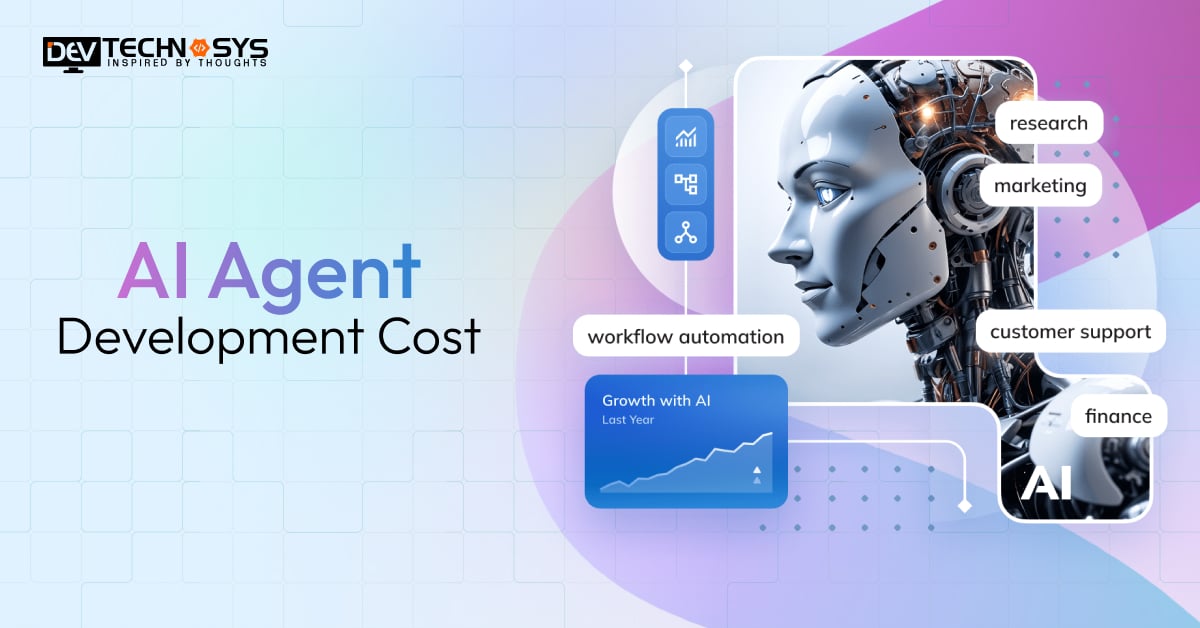“Chain your business earnings with Blockchain technology.”
As you know that there is risk in doing business, so why not use Blockchain to level up the standard of your services. It is really interesting to know that several Blockchain benefits for business investors come after integrating the technology with existing systems. It is the 3rd decade of the 21st century, where new technologies like AI, cloud, and AR/VR are emerging rapidly.
Key takeaways:
-
- Discussing major benefits of using Blockchain.
- Implementation of Blockchain in various industries.
- Top use cases and worldwide famous examples.
- You will get a certified method to implement Blockchain technology.
- Severe challenges and future opportunities for business investors.
Similarly, Blockchain also helps businesses in many ways by providing security, transparency, and flexibility. Do you know why are companies investing in blockchain in 2025? It is because the technology enhances business processes and improves user experiences.
So, if you are looking to implement Blockchain with your business, then this blog is for you. Let’s dive into it and explore more.
What is Blockchain?
A decentralized digital ledger technology called blockchain safely logs transactions on several machines. It uses consensus processes and cryptographic techniques to provide security, transparency, and immutability.
The Blockchain technology in mobile apps is perfect for reliable, peer-to-peer data sharing. Each transaction is saved in a block and connected to the one before creating an unchangeable chain.
Various Branches of Blockchain
1. Public Blockchain:
Open to everyone, this type allows anyone to participate and validate transactions. Examples include Bitcoin and Ethereum, ideal for transparency and decentralization.
2. Private Blockchain:
Controlled by a single organization, access is restricted to selected participants. Used in enterprise settings for internal operations with higher security and speed.
3. Consortium Blockchain:
Governed by a group of organizations rather than a single entity. The Blockchain benefits for business investors offers decentralization and controlled access for industries like banking and supply chain.
4. Hybrid Blockchain:
Combines elements of both public and private blockchains. It allows businesses to keep some data public while keeping sensitive data private, enabling flexible use cases.
5. Sidechain:
An independent blockchain that runs parallel to a main blockchain (mainnet). It enhances scalability and enables experimentation without affecting the main network’s performance.
Understand the Blockchain Market
Various industrial domains are experiencing explosive growth, driven by Blockchain investment and diverse use cases. Here’s a snapshot of its current scale and projected future trajectory:
- 2024 Global Market Size: Estimated between $20 Billion and $31 Billion, depending on the source.
- 2025 Forecast: Anticipated to reach approximately $33.5 billion to $41.1 billion, growing from around $26.9–$31 billion .
- CAGR (2025–2030): Expected compound annual growth rate of 53%–57%, with some estimates up to 90% in certain reports .

- 2030–2034 Projections: Market value is forecasted to soar to $1.4 trillion–$3.15 trillion by 2030/2034.
- Regional Dominance: North America holds the largest share (~37%–46%), supported by strong enterprise and public-cloud blockchain adoption.
Major Blockchain Benefits for Business Investment
There are various blockchain benefits for business investors that improve security and streamline processes through decentralized systems. These advantages are helping a number of industries in 2025:
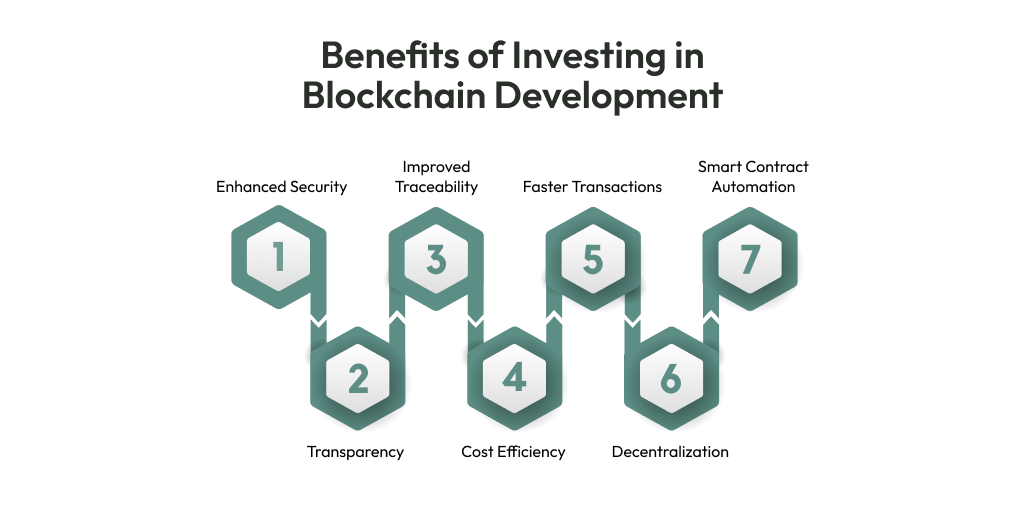
1. Enhanced Security
Blockchain protects data from alteration and unwanted access by using sophisticated encryption algorithms and a decentralized architecture. Every transaction is safely encrypted and connected to the server. Security is among the top benefits of blockchain for business investors.
2. Transparency
Do you know why businesses invest in blockchain? In a blockchain network, the same real-time data ledger is accessible. Throughout transactions and collaborations, this shared visibility fosters greater accountability. The Blockchain for small businesses facilitates auditing procedures and stops fraud.
3. Improved Traceability
The benefits for business to use blockchain makes it possible to track assets, goods, or data all the way through the supply chain. It assists companies in promptly finding the causes of errors, hold-ups, or inefficiencies. For sectors like food and medicines, this degree of traceability is essential.
4. Cost Efficiency
Blockchain lowers operating expenses by doing away with middlemen and using smart contracts to automate processes. Faster, digital alternatives take the place of manual procedures and third-party verifications. You may choose blockchain platform to reduce fraud and human error losses.
5. Faster Transactions
Blockchain eliminates conventional bottlenecks like banks and clearinghouses, allowing transactions to happen almost instantly. This is particularly advantageous for international trade and cross-border payments. Fast payment is among the best benefits of blockchain for businesses.
6. Decentralization
The blockchain distributes trust among all parties and is not controlled by a single party. This lessens the possibility of one person manipulating the situation or of centralized failure. An Ethereum development company may help businesses to promote data governance and boost peer-to-peer connections.
7. Smart Contract Automation
Self-executing agreements that are directly programmed onto the blockchain are known as smart contracts. Its blockchain benefits for business eliminate the need for human oversight by automatically initiating activities when predetermined circumstances are satisfied.
Blockchain Shaping Various Industries in 2025
By increasing security and transparency, blockchain technology is revolutionizing industries in 2025. These solutions are lowering fraud with intelligent data management in a variety of industries:
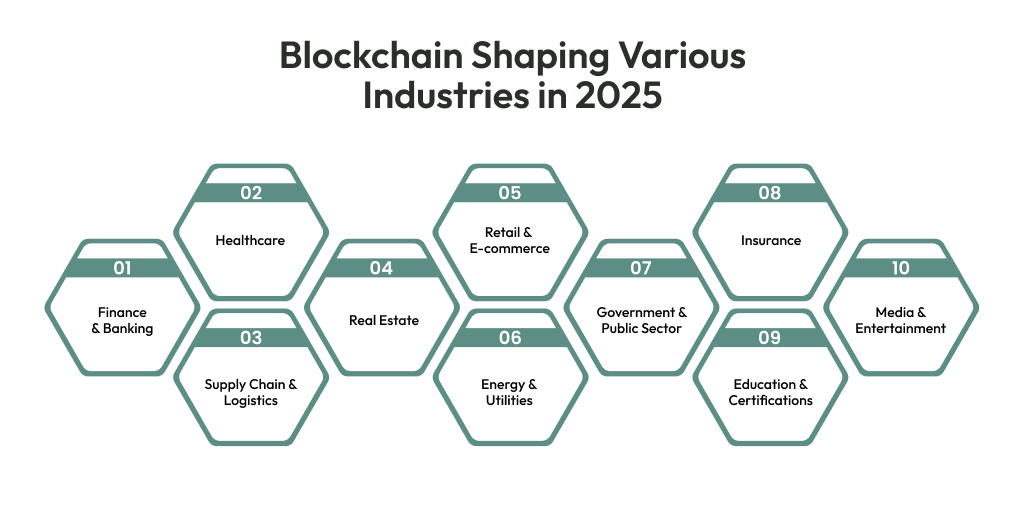
1. Finance & Banking
Blockchain in financial services facilitates real-time settlements and less expensive cross-border payments. It is important to know how dApps work for asset management. Transaction records are unchangeable, as it increases transparency and improves fraud detection.
Impact: Faster, transparent cross-border payments that reduce costs and settlement time using decentralized networks.
2. Healthcare
Blockchain protects electronic health records, guaranteeing that patient information is correct and only available to those who are permitted access. It enhances data interchange amongst providers and simplifies consent management.
Impact: Secure and interoperable patient records, ensuring data privacy and seamless information sharing among providers.
3. Supply Chain & Logistics
Blockchain records each stage of a product’s journey in real time, increasing supply chain visibility. Blockchain for supply chain management increases accountability among distributors and suppliers, guarantees authenticity, and lowers fraud.
Impact: End-to-end product traceability, enabling real-time tracking and verifying authenticity from origin to destination.
4. Real Estate
By doing away with the need for intermediaries and paperwork, smart contracts streamline real estate transactions. Blockchain expedites ownership transfers, lowers fraud, and permits safe title verification. By tokenizing real estate assets, business use of blockchain permits fractional ownership.
Impact: Smart contract automation, which speeds up property transactions and reduces dependency on intermediaries.
5. Retail & E-commerce
By confirming product authenticity and following products from point of origin to point of delivery, blockchain increases consumer trust. Through token-based systems, it facilitates safe and transparent payments. You may hire a STO development company to implement loyalty programs.
Impact: Product authenticity verification, allowing customers to trace the origin and journey of purchased goods.
6. Energy & Utilities
Blockchain facilitates decentralized energy grids and peer-to-peer energy trading. It increases the openness of utility billing, carbon credits, and the supply of renewable energy. Smart contracts are used by energy firms to automate and optimize the distribution of energy.
Impact: Decentralized energy trading, enabling peer-to-peer exchange of renewable energy and real-time grid optimization.
7. Government & Public Sector
Businesses must know how blockchain is transforming industries in 2025. Blockchain is used by governments for effective public record-keeping, transparent voting procedures, and safe identity management. It helps to produce tamper-proof audit trails for transactions and services.
Impact: Tamper-proof digital identities, improving citizen services, voting security, and public record transparency.
8. Insurance
By automating claim processing, smart contracts cut down on paperwork and stop fraud. Blockchain provides safe, reliable records for underwriting and policy administration. By making claim histories clear, it increases consumer and insurer trust.
Impact: Automated claims processing, reducing fraud and paperwork through self-executing smart contracts.
9. Education & Certifications
Blockchain technology is being used by educational institutions to provide certificates, transcripts, and degrees that cannot be altered. It speeds up recruiting and reduces fraud by assisting companies in rapidly verifying academic records.
Impact: Blockchain-based digital credentials, providing verifiable and tamper-proof academic records.
10. Media & Entertainment
Blockchain gives content producers more power by managing their rights and enabling direct monetization. By knowing differences between Polygon vs Binance, you may track digital assets and confirm ownership on the blockchain to fight piracy.
Impact: Transparent royalty distribution, ensuring fair payments to creators through smart contract-enabled platforms.
Interested in a chatbot demo, pricing, or more info? Fill out the form our expert will contact you shortly.
-
Chatbot Demo
-
Cost to Develop an app
-
Industry Report
-
Case Study
Leading Business Use Cases of Blockchain in 2025
Several blockchain benefits for business investors include top use cases. They can automate transactions and increase transparency. These use cases are changing function, communication, and credibility:
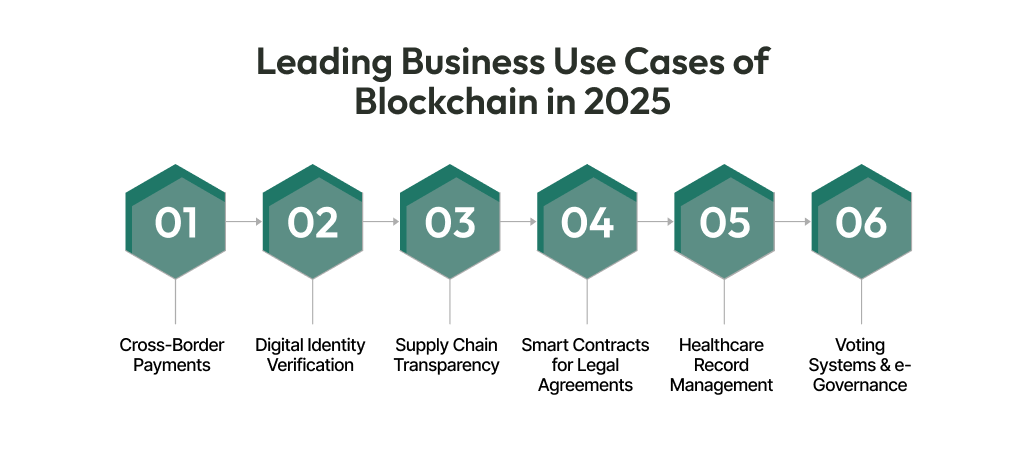
1. Cross-Border Payments
By removing middlemen, cutting expenses, and facilitating real-time settlements, blockchain simplifies international payments. Cross-border transactions are handled safely and with greater traceability and transparency. These blockchain business applications lessen exchange rate complications and delays.
2. Digital Identity Verification
On a decentralized network, Public vs Private Blockchain enables people and organizations to keep and manage their identities. By enabling quick and safe identity checks, it removes the need for further verification processes. This is particularly useful for online authentication, banking, and KYC procedures.
3. Supply Chain Transparency
Businesses may track things from start to finish by documenting every movement or transaction on a blockchain ledger. It enhances responsibility throughout the supply chain, guarantees authenticity, and identifies fraud. Verifying the product’s origin and ethical sourcing also benefits customers.
4. Smart Contracts for Legal Agreements
When certain criteria are met, smart contracts automatically carry out predetermined terms without the need for middlemen. They lower the danger, expense, and duration of conventional legal procedures. They are used by businesses for automatic payments, service contracts, and lease agreements.
5. Healthcare Record Management
Blockchain protects patient medical records and guarantees that only authorized people can access data. It permits smooth sharing across providers while preserving integrity and anonymity. You may avail Blockchain development services for better diagnosis, treatment planning, and patient control.
6. Voting Systems & e-Governance
Digital voting solutions that are safe and impenetrable thanks to blockchain improve electoral accessibility and transparency. Businesses must use blockchain for data security to record every vote, guarding against fraud and maintaining public confidence.
Top Examples of Blockchain Investment
To promote innovation and trust, top governments and corporations are investing in blockchain technology in 2025. These practical applications demonstrate change in blockchain for various industries:
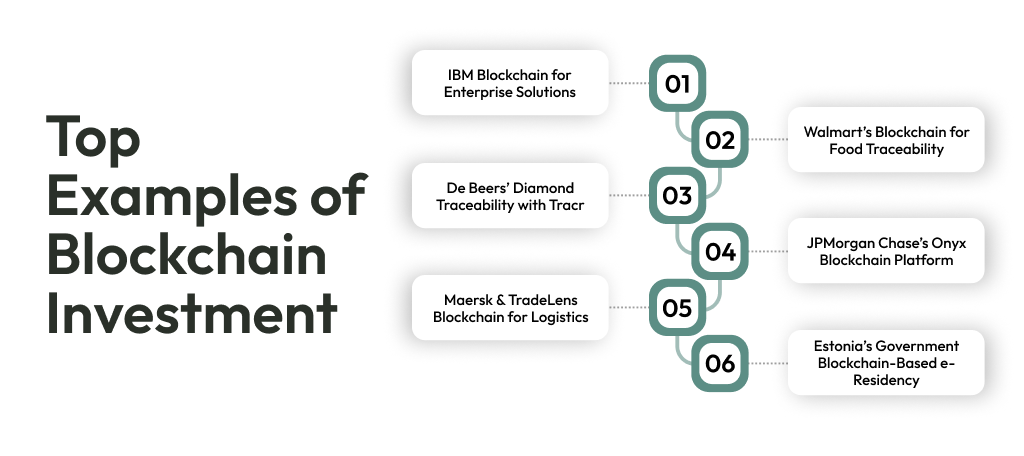
1. IBM Blockchain for Enterprise Solutions
Businesses can create safe, scalable blockchain applications using IBM’s Blockchain-as-a-Service (BaaS). The platform offers solutions for automation and transparency to sectors like finance, healthcare, and logistics. The use of blockchain in business operations is transforming the user experiences.
- Permissioned Blockchain Network: Provides secure, customizable networks tailored for enterprise use.
- Supports Multiple Industries: Enables applications across finance, healthcare, supply chain, and more with scalable infrastructure.
2. Walmart’s Blockchain for Food Traceability
Walmart tracks food products from farm to shelf using blockchain technology to guarantee safety and freshness. It implemented a technology in collaboration with IBM that cuts tracking time from days to seconds. This Blockchain platform increases consumer trust and is used to identify sources.
- Real-Time Tracking: Reduces food traceability time from days to seconds.
- Enhanced Food Safety: Helps identify contamination sources quickly, improving product recalls and consumer trust.
3. De Beers’ Diamond Traceability with Tracr
A blockchain network called Tracr was introduced by De Beers to track diamonds from the mine to the store. It helps get rid of conflict diamonds by confirming authenticity and ethical sourcing. The complete digital history of every diamond is now available to retailers and consumers.
- End-to-End Diamond Tracking: Traces diamonds from mine to retail to ensure authenticity and ethical sourcing.
- Immutable Digital Records: Each diamond’s journey is recorded securely to prevent fraud and conflict diamond sales.
4. JPMorgan Chase’s Onyx Blockchain Platform
JPMorgan’s blockchain-based digital asset, payment, and financial services platform is called Onyx. In addition to facilitating interbank data sharing and transaction settlement, it supports JPM Coin for fast payments. The blockchain adoption in business is governed by all enterprises.
- JPM Coin for Instant Payments: Enables secure, real-time settlements for institutional clients.
- Interbank Information Network: Facilitates seamless data exchange between participating banks for faster transaction processing.
5. Maersk & TradeLens Blockchain for Logistics
TradeLens was created by Maersk and IBM to improve international shipping’s efficiency and transparency. The blockchain platform offers real-time cargo visibility and digitizes supply chain documentation. You may approach a Blockchain development company to improve stakeholder trust.
- Digitized Shipping Documents: Reduces paperwork and improves operational efficiency.
- Transparent Cargo Tracking: Allows all stakeholders to access real-time shipment data for better coordination.
6. Estonia’s Government Blockchain-Based e-Residency
Blockchain technology is used by Estonia’s e-Residency initiative to provide safe digital identities to international business owners. It makes it possible to access Estonian government, banking, and company formation services from a distance.
- Secure Digital Identity: Provides global entrepreneurs access to Estonia’s digital infrastructure.
- Access to Government Services: Enables remote company formation, banking, and secure document signing.
Potential Risks with Blockchain Adoption
Blockchain has a lot of potential, but companies may face some challenges. Unlocking the full potential of the technology requires an understanding of these issues and the application of strategic solutions:
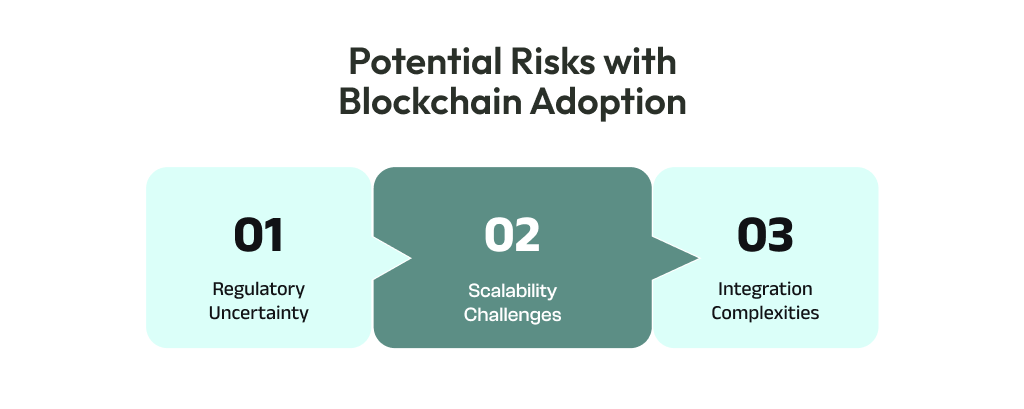
1. Regulatory Uncertainty
Legal frameworks for the usage of blockchain are still being developed by governments. This leads to misunderstandings regarding cross-border transactions and ROI from blockchain investment.
Solution: To guarantee compliance, keep abreast of regional laws and work with legal counsel.
2. Scalability Challenges
Slower processing rates and large transaction volumes are problems for many blockchain networks. Their effectiveness in extensive enterprise applications is thus constrained.
Solution: Choose an OTC crypto exchange development company to implement Layer 2 protocols.
3. Integration Complexities
Blockchain integration with older systems can be expensive and technically challenging. It frequently necessitates major adjustments to current workflows and infrastructure.
Solution: To build smooth connections between blockchain and current systems, use middleware APIs.
How to Invest in Blockchain Development?
To provide blockchain investment returns, a well-defined and solid technological plan is necessary. Through a methodical strategy, you may successfully invest in blockchain for innovation and expansion:
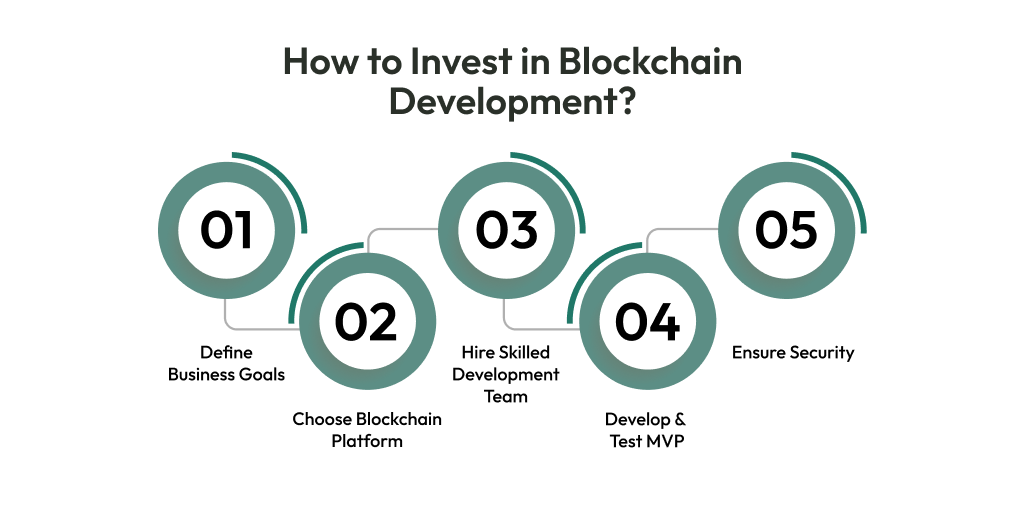
1. Define Business Goals
Start by determining which particular issues in your company or sector blockchain can address. Decide if operational efficiency, automation, data security, or transparency are your main concerns. Having well-defined objectives guarantees that the project is in line with business value and directs all subsequent development choices.
- Identify specific problems or inefficiencies in your industry.
- Set clear, measurable objectives to track the impact of blockchain integration.
2. Choose Blockchain Platform
Choose a blockchain platform such as public, private, or hybrid depending on the requirements of your project. Well-liked options include Solana for scalability, Hyperledger for enterprise use, and Ethereum for smart contracts. Prior to committing, consider platform attributes like cost, ecosystem support, speed, and security.
- Evaluate platforms based on scalability and security features.
- Consider public, private, or consortium blockchain for best fit.
3. Hire Skilled Development Team
Building scalable and secure blockchain solutions requires a skilled team. Seek out developers that have worked with decentralized apps (dApps), smart contracts, cryptography, and platform-specific languages. To speed up delivery, you may approach an ICO development company at lower rates.
- Look for developers experienced in blockchain languages like Solidity.
- Include cross-functional experts such as blockchain architects.
4. Develop & Test MVP
To test essential blockchain features with the least amount of risk, create a Minimum Viable Product (MVP). You can collect feedback, validate use cases, and improve performance at this phase. Test extensively for errors, logical fallacies, and user experience using agile methodologies.
- Build a minimum viable product focusing on core functionalities.
- Conduct rigorous testing like unit, integration, and security testing.
5. Ensure Security
Blockchain technology is visible and irreversible, so security is essential. Put in place access controls, smart contract audits, and industry standard compliance. Code reviews, encryption, and routine testing all aid in defending against vulnerabilities and online attacks.
- Implement best practices like secure key management.
- Stay updated on emerging threats and blockchain security standards.
Future Blockchain Trends for Businesses
With emerging trends, various blockchain benefits for business investors is changing the ecosystems. Across industries, these technologies are opening the door to more automation, efficiency, and trust:
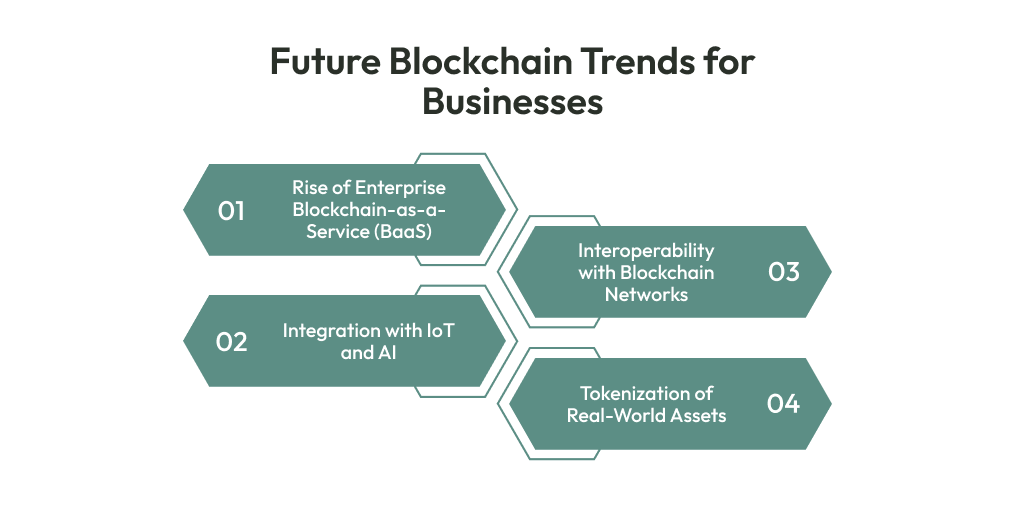
1. Rise of Enterprise Blockchain-as-a-Service (BaaS)
Without requiring extensive technical expertise, BaaS systems allow companies to create, host, and manage blockchain applications. Cloud-based architecture of blockchain for enterprises that may be customized is offered by major providers including Amazon, IBM, and Microsoft.
2. Integration with IoT and AI
Data from IoT devices is protected by blockchain because it is traceable and impenetrable. It enables automated procedures, intelligent decision-making, and real-time analysis when paired with AI. Supply chains, predictive maintenance, and smart city projects are the future of blockchain in business.
3. Interoperability with Blockchain Networks
Companies are requesting that various blockchain platforms like Ethereum vs Solana communicate with each other. Interoperability guarantees that data and assets can flow freely between chains such as Solana, Ethereum, and Hyperledger. It encourages cooperation between ecosystems and applications.
4. Tokenization of Real-World Assets
Blockchain for digital transformation makes it possible to digitally represent tangible items like commodities and artwork. Fractional ownership, enhanced liquidity, and transparent trade are governed by tokenization. This democratizes access to historical assets and creates new investment opportunities.
In a Nutshell!!
The blockchain benefits for business investors that we have discussed in this blog are applicable for all types of entrepreneurs. It is important to understand what is blockchain app development before investing in the technology. Additionally, you may approach an experienced mobile app development company like Dev Technosys for using the related tech stack.
Now, it must be clear for entrepreneurs what are the benefits of blockchain for business in the current time. Several industries are getting benefitted with the Blockchain as it is known for delivering security, transparency, and maintaining the digital identity. So, you must fix a budget to involve this technology in your business processes and make huge profits.
FAQs
Q1. How Blockchain Investments are Rising in 2025?
The growing need for decentralized, transparent, and safe systems is driving a sharp increase in blockchain investments in 2025. Blockchain is being used by businesses across a variety of industries to improve trust, automate processes, and lessen the need for middlemen.
Q2. What are the Main Streams of Blockchain Technology?
- Public Blockchain – Open to everyone and used in cryptocurrencies.
- Private Blockchain – Controlled by a single organization for internal data sharing.
- Consortium Blockchain – Shared between multiple organizations and ideal for supply chains.
Q3. Which Industries are Leading in Blockchain Adoption in 2025?
- FinTech – For cross-border payments.
- Supply Chain– Enhancing transparency in global trade.
- Healthcare – Securing patient records.
Q4. Is Blockchain Suitable for Small and Medium-Sized Enterprises (SMEs)?
Yes, low-code development tools and reasonably priced BaaS systems have made blockchain more and more feasible for SMEs. It assists SMEs in effectively managing contracts, securing transactions, and confirming identities without the need for expensive infrastructure.
Q5. What are the Limitations of Blockchain Adoption for Businesses?
- Regulatory Uncertainty – Laws can impact implementation.
- Scalability Issues – Some networks require high-volume transactions.
- Integration Challenges – Difficult to align with existing IT systems.
Q6. How can a Business Start Implementing Blockchain in 2025?
- Identify Use Cases – Focus on pain points like data security.
- Choose Right Platform – Evaluate options like Ethereum.
- Develop an MVP – Build and test MVP.















